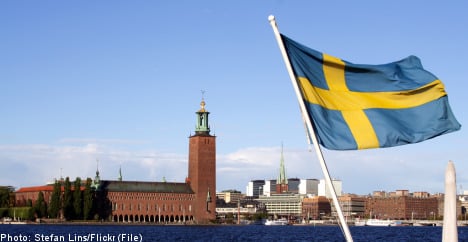“Sweden’s success has had nothing to do with the welfare state,” the report’s author, Nima Sanandaji, tells The Local.
“If you want to argue for the benefits of a free market economy, Sweden is a great example.”
Sanandaji, an Iranian-born Kurd who came to Sweden as a child, lays out his contrarian case in a paper published recently by the Institute of Economic Affairs in the UK.
The “Swedish model” of high taxes and generous welfare benefits has long been held up by parties on the left in the UK and the United States as an example of a high-tax society with solid economic growth.
In recent years, Sweden has also received a great deal of attention for the way in which the country has successfully navigated the global financial crisis without suffering from a prolonged rise in unemployment or negative growth.
But Sanandaji, who founded the liberal Swedish think tank Captus, explains that much of the praise for Sweden’s economic model is misplaced.
“The idea of Sweden being some sort of socialist utopia is very widespread. Sweden has a lot of positive social outcomes and is known as a social democracy with high taxes. But this myth is more a product of correlation rather than causation,” he says.
According to Sanandaji, the ingredients that have contributed to Sweden’s success – high social trust and an embrace of free-market ideology – were in place well before the country’s welfare state expanded in late 1960s and 1970s.
“Sweden was a place with high equality, few social problems, and a high life expectancy before it started expanding its welfare state,” he says.
He points out that in 1975, Sweden was the 4th richest industrialized country in terms of GDP per head.
But by 1993, following two decades of increasing taxes and an expansion of the state sector, Sweden had fallen to 14th.
“Since the start of the social democratic era in Sweden, the country’s growth trajectory has been lower,” says Sanandaji.
“Sweden has done best when it has had a small welfare state. When the welfare state expanded, it crowded up private sector jobs and growth.”
In Sanandaji’s view, Sweden’s ballooning public sector left the country handicapped in terms of its economic potential, having a “devastating” effect on entrepreneurship.
Since 1970, Sweden saw a significant drop in the establishment of new firms, he explains.
Moreover, of the 100 firms with the highest revenues in Sweden in 2004, only two were entrepreneurial Swedish firms founded after 1970, while 21 had been founded before 1913.
“In reality, Sweden should be richer than it is. It’s like other countries are running next to an Olympic runner with weights tied to his feet,” he explains.
“Sweden should be richer than the United States.”
Not only has Sweden’s expanding state hampered the country’s growth, according to Sanandaji, it has even altered traditional “Swedish” or “Scandinavian” social norms of hard work, and social trust which he credits with spurring Sweden’s past economic success.
“Since the early 1980s, Swedes have become more accepting of taking welfare benefits to which they are not entitled,” he says.
As evidence, he points to figures from the World Value Survey which shows that the percentage of Swedes who said it was “never justifiable” to claim benefits to which one wasn’t entitled dropped from 82 percent in the early 1980s to 55 percent at the start of the 2000s.
Sanandaji says as well that Sweden’s large state structure and rigid labour market rules are also to blame for the country’s struggle to integrate foreigners.
While a shift from labour migration to refugee migration has also contributed to higher unemployment rates among Sweden’s foreign-born, Sanandaji contends that even highly-educated foreigners have struggled to enter the Swedish labour market.
“The social problems we have today are often centered on immigrants because they have such a hard time gaining access to the Swedish system,” he explains.
“If the Swedish system is so good, then immigrants should also experience good outcomes. But that’s not the case. It becomes much harder for immigrants to succeed here than compared to, for example, Canada.”
Sanandaji says the policies of the current centre-right government is bringing Sweden back toward the sort of low-tax, free-market oriented country that helped spawn its success in the 20th century.
“Sweden was the perfect country for big government, but Swedes are now moving in a different direction,” he says.
“In reality, Sweden’s ‘Third Way’ was a failed experiment and the two decades of Third Way-socialism in the 1970s and 1980s should be seen as a parenthetical detour, rather than the norm.”
David Landes



 Please whitelist us to continue reading.
Please whitelist us to continue reading.
Member comments